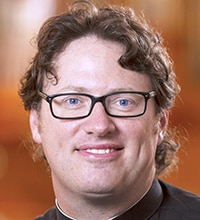
“Did God really tell you?” the serpent asked. “God said,” the woman answered (Gn 3:2-3). In the moment of her temptation, at the beginning of her sin, she remembered the word of God. Not without the truth, she was not alone with the serpent. It was not inevitable that she would fall; she was not entirely vulnerable. God was present in the commandment, present in her memory, St. Augustine said. That’s what made it sin, that she wasn’t invincibly ignorant but rather willfully rebelled against the commandment of God. That she chose what was false over what was true — the devil’s account of things, not God’s — that’s what made it sin. The betrayal of God’s word.
That’s how Eve not only is our ancestor but our sister — Adam, too. The story told here of the Fall tells us our story: the story of our sin, our anxieties and the wear and tear of the world that follows on from our sin. God is present in our memories, too. In what we’ve been taught and in what’s written in our hearts, the natural law, God is present, too. We’re no different from Eve, no different from Adam. We know what God said — or at least we could know it — but we choose what’s false over what’s true — the devil’s account of things, not God’s. It’s what makes us sinners, too: the betrayal of God’s word.
| February 26 – First Sunday of Lent |
|---|
|
Gn 2:7-9; 3:1-7 |
Hence this passage from Matthew. It’s not hard to see why the Church gives us these two stories this first Sunday of Lent. Together, they’re meant to tell us the story of redemption, of what we will see God accomplish in Christ this Lent. Eden has become a desert, but now Jesus stands in our place. The devil tests the Lord just as he tested Eve and Adam. Yet this time, to put it simply, Jesus wins.
But, as I said, we should read ourselves into these stories. These are stories not just about redemption, as such, but about your redemption and mine. That is, we should make these stories personal. If we’re honest in the slightest, we, too, will admit that we’ve done the same as Eve. We, too, have betrayed God’s word. But Jesus Christ enters the deserts of our hearts; he stands and tells the devil off, showing us how to resist him, strong with God’s word. Yes, we’ve sinned; yes, we’ve turned our backs on God’s word, but Jesus comes to us; he chases off the devil and shows us how to resist him — strong in Jesus, strong in God’s word. He reverses the curse for us, too.
Practically, though, what’s this mean? It’s a good first lesson of Lent. As baptized believers in Christ, the word of God abides within us. We are, therefore, strong enough to withstand the world, the flesh and the devil. But still, it’s a battle! As Jesus showed us, we must rely on God’s word. We must not just remember God’s word; we must live according to God’s word. We must know God’s word, and we must let it form and guide our lives. Otherwise, we’re just the devil’s punks, not the sort of Christians we should be at all, not the conquerors we’re meant to be.
So, open your Bibles. That’s always a good thing to do, but especially in these early days of Lent. Join a Bible study, listen to a Bible podcast or just read it for yourself. The Scripture is a strong defense to those humble and wise enough to read, study, learn and inwardly digest it. May it be so for you. May we be strong, not weak. May we be faithful doers of God’s word, not betrayers.
Father Joshua J. Whitfield is pastor of St. Rita Catholic Community in Dallas and author of “The Crisis of Bad Preaching” (Ave Maria Press, $17.95) and other books.





